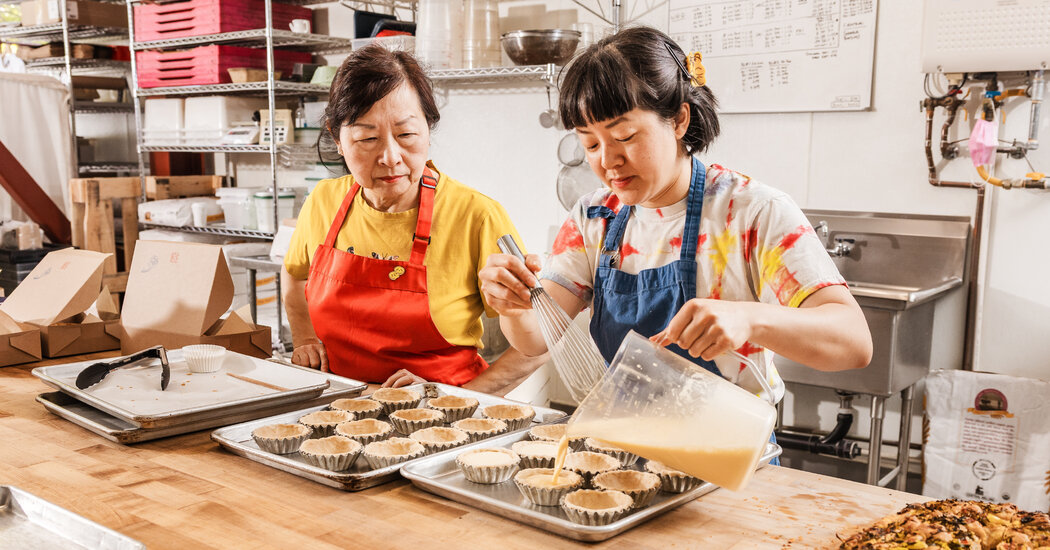Jennifer Lu stood quietly behind a wooden counter modestly adorned with a golden bucket of candy and red flags celebrating the Year of the Snake, which also happens to be the name of her daughter Patty Lu’s pastry pop-up.
On that particular day, Patty Lu stood zen-like and laser-focused, flipping pastries with chopsticks in the fryer in the cavernous commercial kitchen they operate out of in Berkeley, Calif. But the elder Ms. Lu admitted later in a phone call that they have sometimes fought in front of customers — loudly.
When Patty Lu started her pop-up in the East Bay three years ago, she recalled being in the weeds and behind on orders, when her mother appeared in line with her friends to buy pastries. She immediately jumped in to help.
“She’s shown up every weekend since and just hasn’t left,” said Patty Lu, whose mother continues to drive two hours each week to help out.
Parents have become more involved in their adult children’s lives and most report that it’s for the positive. According to a Pew Research Center survey, nearly 41 percent of parents reported that their young adult child relies on them for a strong amount of emotional support, with mothers identifying as the source of emotional support more frequently than fathers.
The feelings are mutual, and many adult children describe their relationships with their parents as healthy and fulfilling.
Still, even the healthiest mother-child dyad lacks immunity against the stress of running a food business together. That particular insidious pressure is commonly known: The restaurant industry is identified as having one of the highest failure rates among businesses in the United States.
Running a business together can reveal fissures in mother-child relationships that were previously (and likely to have remained) dormant. Dr. Steve Lee, a professor at the University of California, Los Angeles’s Department of Psychology, made the analogy of a ship being steered capably for long passages of time, assuming its course, without knowing the issues that lie below. Environmental stressors can reveal the uncomfortable truths hiding underneath the surface all along.
“When you go from implicit to more explicit, there’s sometimes a reaction,” Dr. Lee said. “It can get bumpy.”
The strains that occur are not necessarily confined within the restaurant walls. Life continues outside of work, and lines between family issues and the restaurant can become blurred.
In September 2018, Keegan Fong signed the lease to his restaurant, Woon, in Los Angeles. Two weeks later, his mother, Julie Chen Fong, was diagnosed with breast cancer.
Neither had experience cooking in professional kitchens nor running a restaurant. The menu reflected Mr. Fong’s experience as a Chinese American growing up on his mother’s Shanghai-style cooking. The interpretation of that intersection turned out to be delicate, since the restaurant utilized Ms. Fong’s recipes.
“It’s a fine line that I walk because this restaurant is an ode to her,” Mr. Fong said. “But at the same time, how do I not make it 100 percent about her and not make it 100 percent about me.”
In the weeks leading up to the restaurant’s opening, Ms. Fong would drive 40 minutes to Woon after her radiation treatment in the mornings to taste-test the dishes and train the newly hired staff. Both mother and son recalled incessant arguing at the beginning.
“It hurt at first — arguing and arguing,” Ms. Fong said. Tensions continued to peak as the restaurant navigated the Covid-19 pandemic a year later. With the additional stress, Mr. Fong remembers, at their lowest, his mother angrily threatening to sue him.
Since then, both have learned give each other space. Mr. Fong became better at establishing boundaries, while Ms. Fong has stepped back from the restaurant’s kitchen and focused on life outside of the restaurant, watching her grandchildren.
Despite tensions in the workplace, contrasting personalities and business styles can be a mother-child superpower.
“We are total opposites. Working with family is not for everyone,” said Nur-E Farhana Rahman, who works with her mother, Nur-E Gulshan Rahman, at Korai Kitchen in Jersey City. Ms. Rahman considers herself conservative when it comes to making business decisions. Her mother tends to take bigger risks.
“If it had been just me, this restaurant would have never opened because we had no restaurant experience, no capital and no investor,” Ms. Rahman said.
Her mother simply told her daughter: We’ll figure it out.
And they did. More than seven years later, Ms. Rahman continues to handle the business operations while Nur-E Gulshan cooks. Ms. Rahman said their disagreements and paradoxical business personalities often result in something fruitful.
In 2023, Anna Torrealba took over as chef de cuisine at her mother Illiana de la Vega’s longstanding Austin restaurant, El Naranjo. Getting older, Ms. de la Vega was happy to pass the baton to one of her children.
But trust can take time to build, especially when traditions are at stake. Ms. de la Vega had confidence in her daughter’s palate, though more complex dishes like the restaurant’s mole required training, she said.
While Ms. de la Vega acknowledged her daughter’s strengths as a chef, they still sometimes disagreed when Ms. Torrealba wanted to modernize parts of the menu.
Eventually, Ms. de la Vega realized that most of the changes her daughter implemented appealed to a new, younger clientele.
“I just got used to it,” said Ms. de le Vega, trusting that her daughter’s choices preserved the cooking methods, flavors and legacy of the restaurant.
In 2018, Jessica Wang invited her mother to join her selling pastries at pop-ups and teaching cooking classes after doing so on her own for three years. Ms. Wang realized there was a need for a grocery store in Chinatown in Los Angeles when her students would ask where to buy ingredients.
While the construction of the grocery store is underway, the duo continues to sell pastries and prepared foods at pop-ups and offer cooking classes and catering. Ahead of the brick and mortar store opening, Ms. Wang has deeply considered their relationship as boss and employee versus co-owners, and how they should move forward.
“There were some hard moments where I think the dynamic of her being my mom and knowing what’s best for me, and then being the owner and boss of the business has sometimes led to some kind of tensions,” Ms. Wang said.
“I just shut up and try to listen,” said Peggy Wang when thinking about their flipped dynamic. Peggy Wang said she’s learned to think outside of the box working with her daughter and from spending more time listening than intervening. “Most things get worse when we respond right away because most of the time that’s the ugly side talking.”
Ms. Lu found a metaphor for the relationship.
“In the mountain, you cannot have two tigers because they’re both leaders,” she said. “As a mom, I will back you up and let you be the boss.”








